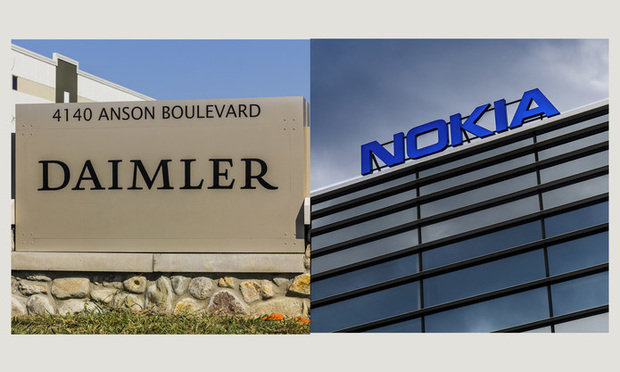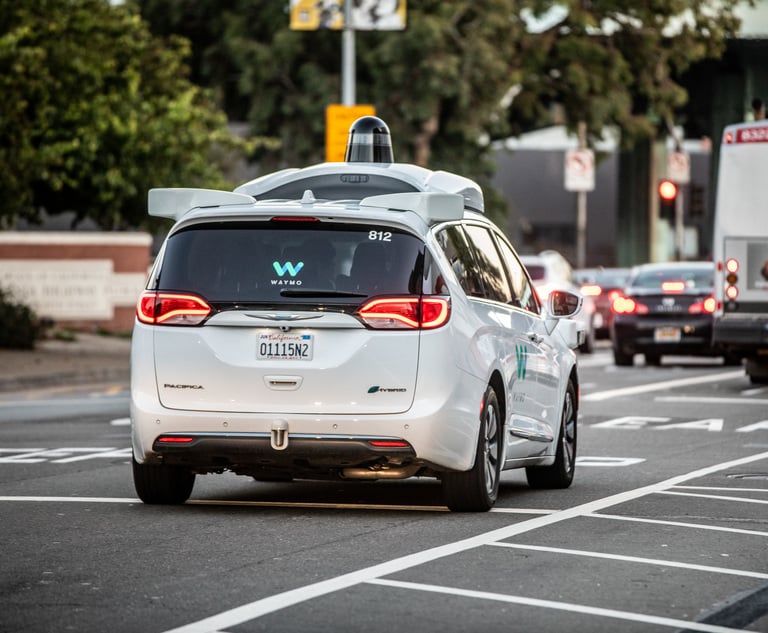Nokia, Daimler, Continental Ramp Up Global Patent Chess Match
Continental made the latest move Wednesday, asking U.S. Magistrate Judge Nathaneal Cousins of San Jose to block Nokia from pursuing patent infringement actions against Daimler in three different German courts.
June 14, 2019 at 06:50 PM
4 minute read

Auto maker Daimler AG, parts supplier Continental AG and technology licensing company Nokia are playing a global chess match over patents essential to connected cars.
Continental made the latest move Wednesday, asking U.S. Magistrate Judge Nathaneal Cousins of San Jose to block Nokia from pursuing patent infringement actions against Daimler in three different German courts. Continental's motion for an anti-suit injunction contends that Nokia is threatening to disrupt Daimler's automobile production before Cousins can decide whether Nokia is licensing its 2G, 3G and 4G patents on fair, reasonable and nondiscriminatory (FRAND) terms.
“The purpose of Nokia's German lawsuits is to pressure Daimler to accept a license on non-FRAND terms by using the threat of an injunction to stop automobile production, and the financial burden of litigating Nokia's scattershot infringement actions,” states the motion, which is signed by Sheppard, Mullin, Richter & Hampton partner Matthew Holder.
Nokia, which has licensed Germany's other two major auto makers through the Avanci licensing platform, has said that it's committed to honoring its FRAND obligations and that Daimler is simply holding out from taking a license.
The dispute has been brewing since 2017, when Nokia and Avanci approached Daimler about licensing its standard-essential patents (SEPs), according to Continental's motion. Continental, which markets telematics control units to Daimler and other auto makers, says it told Nokia it wanted to negotiate, but was rebuffed. “As the parties responsible for implementing the technology, component suppliers are in a much better position than OEMs to determine whether or not a given component practices a patented technology,” Holder writes in Wednesday's motion.
In March of this year, Daimler, Continental and suppliers Bury and Valeo complained to the European Commission that Nokia was shirking its FRAND commitments. Nokia said the complaint was “simply the latest in a long series of actions to avoid taking a license,” and sued Daimler for patent infringement in Munich, Dusseldorf and Mannheim. In May it moved to enjoin Daimler from practicing its patents without a license.
Continental sued Nokia, Avanci and three other licensing companies two days later, accusing them of collusively refusing to license at the supplier level. But instead of doing so in Germany, Continental sued in the San Jose division of the Northern District of California, where U.S. District Judge Lucy Koh just ordered Qualcomm Inc. to license its chips to other chip suppliers.
Now Continental is asking Cousins to put the German infringement suits on hold. Holder is using Koh's opinion in FTC v. Qualcomm as Exhibit A, pointing to her finding that Nokia “follow[ed] Qualcomm's lead” in refusing to license at the supplier level.
Nokia, Holder writes, is trying to force Daimler to knuckle under before the court can rule that Nokia must make licenses available on FRAND terms to Continental, “similar to the relief granted by Koh in the FTC v. Qualcomm matter.”
Sheppard Mullin has had success with this argument before. In 2015 partner Stephen Korniczky, the lead lawyer on Continental's team, persuaded U.S. District Judge James Selna to issue an anti-suit injunction that blocked Ericsson from pursuing litigation against handset maker TCL Communications in France, the U.K., Brazil and Russia.
More recently some judges have been pouring cold water on anti-suit injunctions. Qualcomm lost a bid for one against Apple Inc. before Judge Gonzalo Curiel in 2017. Judge William Orrick III granted one to Samsung last year in its licensing dispute with Huawei, but the Federal Circuit sounded poised to overturn it during oral arguments last fall, and Samsung settled a couple months later.
Alston & Bird partner Ryan Koppelman represents Nokia in the Northern District. He did not immediately respond to an email requesting comment Friday afternoon. Avanci, which has called Continental's suit “meritless,” recently substituted a Winston & Strawn team in place of attorneys at Baker McKenzie.
Nokia states on its website that “injunctions with SEPs should not be enforced to prevent the implementation of a standard subject to FRAND undertakings, unless a patent holder has made a FRAND license available and the prospective licensee has been unwilling to enter into such FRAND license or to comply with its terms.”
This content has been archived. It is available through our partners, LexisNexis® and Bloomberg Law.
To view this content, please continue to their sites.
Not a Lexis Subscriber?
Subscribe Now
Not a Bloomberg Law Subscriber?
Subscribe Now
NOT FOR REPRINT
© 2025 ALM Global, LLC, All Rights Reserved. Request academic re-use from www.copyright.com. All other uses, submit a request to [email protected]. For more information visit Asset & Logo Licensing.
You Might Like
View All
Shareholder Democracy? The Chatter Musk’s Tesla Pay Case Is Spurring Between Lawyers and Clients
6 minute read
Willkie Farr & Gallagher Drives Legal Challenge for Uber Against State's Rideshare Laws
5 minute read

EPA grants California authority to ban sales of new gas cars by 2035. Action faces reversal by Trump
Trending Stories
Who Got The Work
J. Brugh Lower of Gibbons has entered an appearance for industrial equipment supplier Devco Corporation in a pending trademark infringement lawsuit. The suit, accusing the defendant of selling knock-off Graco products, was filed Dec. 18 in New Jersey District Court by Rivkin Radler on behalf of Graco Inc. and Graco Minnesota. The case, assigned to U.S. District Judge Zahid N. Quraishi, is 3:24-cv-11294, Graco Inc. et al v. Devco Corporation.
Who Got The Work
Rebecca Maller-Stein and Kent A. Yalowitz of Arnold & Porter Kaye Scholer have entered their appearances for Hanaco Venture Capital and its executives, Lior Prosor and David Frankel, in a pending securities lawsuit. The action, filed on Dec. 24 in New York Southern District Court by Zell, Aron & Co. on behalf of Goldeneye Advisors, accuses the defendants of negligently and fraudulently managing the plaintiff's $1 million investment. The case, assigned to U.S. District Judge Vernon S. Broderick, is 1:24-cv-09918, Goldeneye Advisors, LLC v. Hanaco Venture Capital, Ltd. et al.
Who Got The Work
Attorneys from A&O Shearman has stepped in as defense counsel for Toronto-Dominion Bank and other defendants in a pending securities class action. The suit, filed Dec. 11 in New York Southern District Court by Bleichmar Fonti & Auld, accuses the defendants of concealing the bank's 'pervasive' deficiencies in regards to its compliance with the Bank Secrecy Act and the quality of its anti-money laundering controls. The case, assigned to U.S. District Judge Arun Subramanian, is 1:24-cv-09445, Gonzalez v. The Toronto-Dominion Bank et al.
Who Got The Work
Crown Castle International, a Pennsylvania company providing shared communications infrastructure, has turned to Luke D. Wolf of Gordon Rees Scully Mansukhani to fend off a pending breach-of-contract lawsuit. The court action, filed Nov. 25 in Michigan Eastern District Court by Hooper Hathaway PC on behalf of The Town Residences LLC, accuses Crown Castle of failing to transfer approximately $30,000 in utility payments from T-Mobile in breach of a roof-top lease and assignment agreement. The case, assigned to U.S. District Judge Susan K. Declercq, is 2:24-cv-13131, The Town Residences LLC v. T-Mobile US, Inc. et al.
Who Got The Work
Wilfred P. Coronato and Daniel M. Schwartz of McCarter & English have stepped in as defense counsel to Electrolux Home Products Inc. in a pending product liability lawsuit. The court action, filed Nov. 26 in New York Eastern District Court by Poulos Lopiccolo PC and Nagel Rice LLP on behalf of David Stern, alleges that the defendant's refrigerators’ drawers and shelving repeatedly break and fall apart within months after purchase. The case, assigned to U.S. District Judge Joan M. Azrack, is 2:24-cv-08204, Stern v. Electrolux Home Products, Inc.
Featured Firms
Law Offices of Gary Martin Hays & Associates, P.C.
(470) 294-1674
Law Offices of Mark E. Salomone
(857) 444-6468
Smith & Hassler
(713) 739-1250






